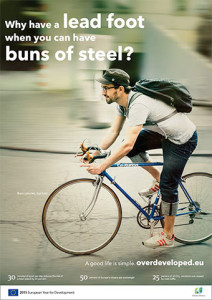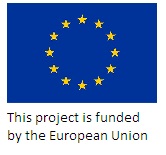EYD2015: The future we want – Local Authorities for Sustainable Development
 The EYD2015: The future we want project, co-financed by the European Commission’s EuropeAid Programme, aims at informing and sensitising decisions makers on local, national and European levels with the objective of achieving strategic political decisions for sustainable development, as highlighted by the post-2015 UN Development Agenda. 17 partners from 10 different European countries work together on the international cooperation project, led by Climate Alliance.
The EYD2015: The future we want project, co-financed by the European Commission’s EuropeAid Programme, aims at informing and sensitising decisions makers on local, national and European levels with the objective of achieving strategic political decisions for sustainable development, as highlighted by the post-2015 UN Development Agenda. 17 partners from 10 different European countries work together on the international cooperation project, led by Climate Alliance.
In the frame of the project, a number of actions will take place simultaneously in the participating countries in order to raise public awareness on the importance of development cooperation while addressing the current challenges of (European) overconsumption of natural resources, particularly forests and forest products. In doing so, local authorities (LAs), NGOs, international organisations, development agencies and indigenous Councillors from the Amazon work together.
The availability and accessibility of resources is crucial for sustainable development and poverty eradication. For the EU, where more than 60% of the required natural resources come from outside Europe, this is a highly relevant issue. Forests – as one of the most important natural resources – are a clear and easily identifiable example concerning several development topics: Forests provide food, water, medicine and shelter, and are also important in regulating rainfall, stabilizing greenhouse gas emissions and securing biodiversity.
Forests link LAs in Europe and Indigenous/Local Peoples in the Global South. Local Authorities in Europe play an important role in the management of natural resources (in several cases they are forest owners as well), and they are responsible for the involvement of citizens in the decision-making processes. Indigenous and local communities in the South have developed alternative strategies based on millenniums of knowledge on how to use natural resources in a sustainable way.
The project “EYD2015: The future we want” brings together the expertise of Indigenous Peoples from the Amazon with Local Authorities in Europe. Working together with indigenous Councillors from the Amazon, the objective is to inform and sensitive political representative on local, national and European levels about the importance of sustainable management of resources and to include the suggestions from the Southern Councillors in their political strategies. What does sustainability means? And how do we all want to live in the future? The project campaign and the visit of several Southern Councillors will help to find answers for these questions.
Regarding IMRO’s role in the project, our organisation is responsible for carrying out a number of activities and awareness raising campaigns in Hungary:
- Supporting the development of campaign materials
- Supporting the EYD2015 EU-wide campaign (including the poster campaign to be implemented in Western-Hungary)
- Participation in experience sharing events where Southern Counsellors (from the Amazonas region) will be invited
- Organisation of an experience sharing event in Nagykanizsa where representatives of Asháninka people from Peru will be present as well.
- Elaboration of educational and information materials for different target groups
- Organisation and coordination of the Train the trainer program in Nagykanizsa
- Organisation and coordination of the ECO-Train and forest experiences programs
- Organisation of competitions and events in kindergartens and schools
- Organisation of an International conference in the City of Nagykanizsa
For more information on this project and current activities, please visit the project’s website and follow us on Twitter to find out more about the upcoming events.
 “This publication has been produced with the assistance of the European Union. The contents of this publication are the sole responsibility of the authors and can in no way be taken to reflect the views of the European Union.”
“This publication has been produced with the assistance of the European Union. The contents of this publication are the sole responsibility of the authors and can in no way be taken to reflect the views of the European Union.”
